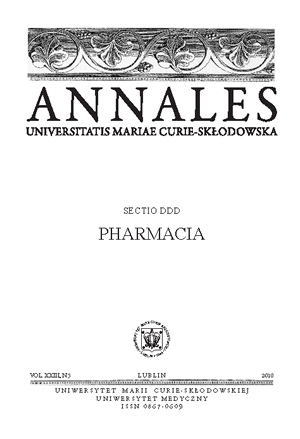Paclitaxel and apoptosis in breast cancer cells
Keywords:
paclitaxel, apoptosis, breast cancer, caspases, microarray methodAbstract
Our analysis was connected with estimation of changes in expression of genes participating in apoptotic process under influence of paclitaxel applied in breast cancer cells in vitro.
Increase of expression of antiapototic genes after administration of paclitaxel in a dose 60 ng/ml requires explanation. These observation suggest that expression of antiapoptotic genes should not be so intense. It is possible that expression of antiapoptotic genes is less that proapoptotic. Another explanation suggests the levels of both group are similar, but because of unknown cell mechanism the prevalence achieve proapototic genes. It is possible that in this process has significance caspase activation, what leads to irreversible reaction cause degradation of cell structures.
Paclitaxel in a dose 60 ng/ml is activated opposing groups of pro and antiapoptotic genes. The probable reason of advantage apoptotic processes over antiapoptotic processes in breast cancer cells may be explained by activation significant numbers of ways connected with phosphorylation of Bcl-2 gene products.
References
Berger T, Brigl M et al. The apoptosis mediator m DAP-3 is a novel member of conserved family of mitochondrial proteins. J. Cell. Sci., 113, 157-171, 2000.
2. Bodnar L., Wcisło G. Docetaksel I paklitaksel: porównanie ch budowy, farmakologii I mechanizmów ich oporności. Współczesna Onkologia 9, 435-446, 2004.
3. Cao Q., Xia Y., Azadniv M., Crispe N.. The E2F-1 transcription factor promote caspase-8 and Bid expression, and enhances fas signaling in T cells. J. Immunol., 173, 1111-1117, 2004.
4. Chang CJ, Wooten EC, et al. Gene expression profiling for the prediction of therapeutic response to docetaxel in patients with breast cancer. Lancet 362, 362-369, 2003.
5. Esposti M.D., The roles of Bid. Apoptosis 7, 433-440, 2002.
6. Gligorov J., Lotz J.P. Preclinical pharmacology of taxanes. Oncologist 9, 3-8, 2004.
7. Hur j. Chesnes J. The bik BH3-only protein is inducted in estrogen-starved and antiestrogen exposed breast cancer cells and provokes apoptosis. Nat. Acad.. Sci.. USA,. 101, 2351-2356, 2004.
8. Kisiel A., Skąpska A., Markiewicz W.T., Figlerowicz M. Mikromacierze DNA. Kosmos 53, 295-303, 2004.
9. Liuh-Yow C, Don C. DAXX silencing sensitizes cells to multiple apoptotic pathways. Mol. Cell. Biol., 23, 7108-7121, 2003.
10. Michaelson JS, Leder P. RNAi reveals antiapoptotic and transcriptionaly repressive activities of DAXX. J. Cell. Sci., 116, 345-352.2003.
11. Micheluides R, Tiemessen M et al. Overexperssion of cyclin D1 enhances taxol induces mitotic death in MCF7 cells. Breast Cancer Res. Treat., 74, 55-63A, 2002.
12. Mukamel Z., Kimch A. Death-associated protein 3 localizes to the mitochondriaand is involved in the process of mitochondrial fragmentation during cell death. J.. Biol. Chem. 279, 3036732-36738, 2004.
13. Ofir R, Seidman R, Robinski T, Krup M. Taxol-induced apoptosis in human SKOV ovarian and MCF7 breast carcinoma cells in caspase and caspase-9 independent. Cell Death Differ. 9, 636-642, 2002.
14. Razzini G, Berrie C.P, Novel function P1 3kinase antagonists inhibit cell growth and tumorgenicity In human cancer cell lines. FASB., 14 1179-1187, 2000.
15. Rzymowska J, Maj P, Niemczyk M, Malewski T, Wilkołaski A. Taxanes and gene expression in breast cancer cells. Acta Poloniae Pharmaceutica. Drug Research 65, 153-157, 2008.
16. Shi Y. Mechanisms of caspase activation and inhibition during apoptosis. Mol. Cell 9, 459-570, 2002.
17. Simsstein R, Burow M. Apoptosis, chemoresistance and breast cancer: insights from MCF-7 cell model system. Minireviev- society for Exp. Biol Medic, 2003.
18. Ziaja-Sołtys M., Rzymowska J. The influence of paclitaxel on the expression of general transcriptional factors in breast cancer cells. Annales UMCS sec. DDD XXXI, 1, 117-123, 2008.
Downloads
Published
Issue
Section
License
Copyright (c) 2010 Authors

This work is licensed under a Creative Commons Attribution-NonCommercial-NoDerivatives 3.0 Unported License.


